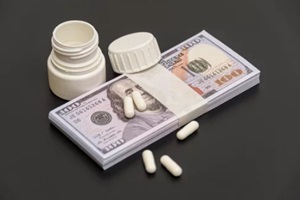 Despite ongoing public scrutiny regarding drug pricing in the United States, major pharmaceutical companies began the new year with hundreds of price hikes.
Despite ongoing public scrutiny regarding drug pricing in the United States, major pharmaceutical companies began the new year with hundreds of price hikes.
Multiple drugmakers, including Pfizer, Sanofi, and Takeda Pharmaceutical, increased the cost of more than 500 drugs in early January 2024.
These price hikes were announced as the Biden Administration prepares to publish significantly reduced prices for ten high-cost drugs later in the year.
Learn more about these price increases and how to keep the cost of employee benefits low.
Extent of Price Increases
Although price hikes are a common occurrence year after year, this year’s price hikes are quickly outpacing inflation.
A recent analysis published by the drug research firm 46brooklyn Research calculated a median percentage wholesale acquisition cost (WAC) increase on brand name drugs of 4.7% in 2024. Some drug prices have increased by 10% or more.
Companies Participating in the Price Hikes
Pfizer, Sanofi, and Takeda are the major pharmaceutical companies participating in price hikes in 2024. Takeda’s Baxalta had a total of 53 price hikes in January, while Sanofi announced that it would increase the cost of its rabies, typhoid fever, and yellow fever vaccines by 9%.
Other pharmaceutical companies, such as UCB Pharma, also increased costs on 40 products. Hill Dermaceuticals had one of the largest price hikes for its Tolak topical cream, which increased by a staggering 33%.
Pfizer as a Standout in Price Increases
Among the companies involved in start-of-year price hikes is Pfizer, a multinational pharmaceutical corporation. Pfizer announced that it would raise the prices of 124 of its drugs and 22 products from its Hospira subsidiary.
This price hike accounts for approximately one-quarter of all planned drug price hikes in January.
Impact on Consumers and Patients
What a patient or consumer typically pays for a medication at the pharmacy counter is the list price, which refers to the price the drug company sets. If the list price goes up, the copay will also likely increase.
However, price cuts do not necessarily equate to cost savings at the pharmacy counter. Instead, the copay could still increase as it causes the drug to transition to a different tier of the insurer’s drug formulary.
Current price hikes are also affecting consumers and patients in other ways.
Price Hikes May Affect Consumers Reliant on Specific Medications
 Consumers who rely on specific medications to treat illnesses or manage chronic conditions may encounter adverse effects. Higher drug prices can lead to greater out-of-pocket expenses for consumers, especially those with inadequate insurance coverage.
Consumers who rely on specific medications to treat illnesses or manage chronic conditions may encounter adverse effects. Higher drug prices can lead to greater out-of-pocket expenses for consumers, especially those with inadequate insurance coverage.
Inadequate or delayed access to certain medications due to increased prices can also have serious health consequences for patients. Certain populations, such as older people, are particularly vulnerable to the effects of drug price hikes.
Potential Implications for Medicare Recipients
With the rollout of new laws designed to reign in prescription drug prices, some pharmaceutical companies are striving to limit cost hikes.
The Inflation Reduction Act requires drug manufacturers to provide Medicare a rebate if they raise certain drug prices above the current inflation rate. Medicare will also be empowered to negotiate prices on certain drugs starting in 2026.
Future Outlook and Policy Implications
With further price hikes on the horizon from major pharmaceutical companies, many consumers are concerned about the potential implications.
Several factors could influence the trajectory of this nationwide issue, such as policy reforms, increased legislative efforts, and value-based pricing.
Potential Developments in 2024 Drug Pricing
Medicare is negotiating prices for the initial round of ten prescription drugs to make high-cost treatments more affordable for older adults.
The outcome of these price talks could potentially threaten the pharmaceutical industry’s profits, revenue growth, and drug innovation.
While these price talks could result in lost revenue for drug makers, there are potential patient savings. This is especially important for older patients struggling to afford their medications.
Broader Implications for Healthcare Policy in the United States
The implications of drug price hikes in the United States are multifaceted. Drug price hikes increase healthcare costs, reducing affordability and limiting access to essential medications.
 Increases in drug prices can also contribute to medication non-adherence, leading to worsened health outcomes.
Increases in drug prices can also contribute to medication non-adherence, leading to worsened health outcomes.
High drug prices also draw public attention and often become the focal point of public discourse. Over time, this can pressure policymakers to address the issue, leading to new policy reforms or legislation.
How New City Can Help Keep Your Benefits Costs Low
With hundreds of price hikes affecting consumers nationwide, many employers are seeking ways to keep their benefits costs low. At New City Insurance, we have worked with countless organizations to maximize employee benefits cost savings without affecting the quality of coverage.
Learn how we can help you manage employee benefits costs by contacting New City at 888.210.2765.
